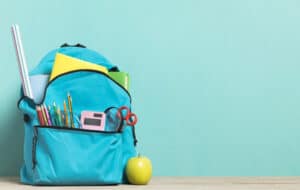After many years of teaching, I have become very aware of the common shortfalls students deal with coming from elementary school. As my own daughter prepares to enter 6th grade, I created a list of skills she needs to be successful in this new chapter of her educational journey.
Learning to Communicate with Adults
As a teacher, one of my biggest pet peeves is receiving emails from students that appear to be rude, or resemble a text message they might send a friend, not their teacher. From the start of an email, teachers often make snap judgements regarding the type of student they are dealing with. A respectful, well-written email can help your child create a strong line of communication with their teacher. On the other hand, a sloppy, misspelled, and informal email can leave your child’s teacher with the impression that the student doesn’t care, or worse, is rude.
Take a moment to teach your child what belongs in a subject line (please don’t use the subject bar as the body); a simple “I need your help with today’s assignment” or “Question about the homework” helps the educator to know it is time sensitive, and deserves their immediate attention.
Don’t forget a greeting! Teachers are often inundated with emails from administrators, parents, and students, and a little courtesy goes a long way in establishing a positive rapport between the student and teacher. A simple “Dear Mr. Williams,” or “Good evening Mrs. Adams,” is polite and always received positively.
Remember to respond to their response. Too often, teachers respond to a student and receive no acknowledgment. It is advisable for your student to promptly acknowledge receipt of a response with a short “Thank you for the information, have a good evening.” This also lets the teacher know that your student is actively engaged in the conversation and is reading their replies.
Organization is a Learned Skill

Cleaning out the backpack every day for the first two weeks of school is important but don’t do it for them. Sit with them as they pull out all of their papers, help them decide what is important and where to file it. Make sure you explain your reasoning so soon they can do it on their own.
Check on that backpack often. Even if they know how to organize their belongings for school, they will need you to remind them; this is important for two reasons: it creates a good habit, and you can stay on top of the materials they are working on in class. A good rule of thumb is a “weekend pass”. My daughter can only begin her fun, weekend activities Friday evening once I have seen a clean and organized backpack!
Using an Agenda and Time Management Strategies

Since tweens are natural procrastinators, I found that an agenda (physical or digital) is key to keeping them on track. My daughter uses her agenda to keep track of all of her assignments: writing them down when they are assigned and including their due date on a second entry. For reading assignments, I have her breakdown the number of chapters or pages so she knows how much to read each day in order to be completed in time. Breaking down assignments into digestible, and easy to achieve goals, makes for a less daunting way to manage their time. Since my daughter often gets overwhelmed, sitting down and planning out what needs to be done each day, keeps her anxiety in check. As a parent, look at their agendas daily, review their daily to-do list, and praise them often for staying on top of their work!
Better Prepared Equals Better Success



